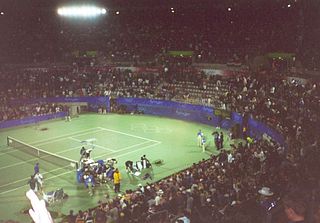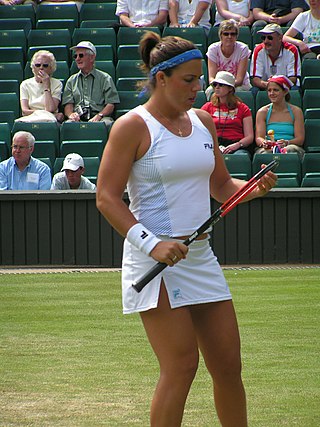
The 1992 Summer Olympics, officially the Games of the XXV Olympiad and officially branded as Barcelona '92, were an international multi-sport event held from 25 July to 9 August 1992 in Barcelona, Catalonia, Spain. Beginning in 1994, the International Olympic Committee decided to hold the Summer and Winter Olympics in alternating even-numbered years. The 1992 Summer and Winter Olympics were the last games to be staged in the same year. These games were the second and last two consecutive Olympic games to be held in Western Europe after the 1992 Winter Olympics in Albertville, France, held five months earlier.

At the 1900 Summer Olympics, a Basque pelota tournament was contested.

Olympic sports are sports that are contested in the Summer Olympic Games and Winter Olympic Games. The 2024 Summer Olympics included 32 sports; the 2022 Winter Olympics included seven sports. Each Olympic sport is represented at the International Olympic Committee (IOC) by an international governing body called an International Federation (IF).

Basque pelota is the name for a variety of court sports played with a ball using one's hand, a racket, a wooden bat or a basket, against a wall or, more traditionally, with two teams face to face separated by a line on the ground or a net. The roots of this class of games can be traced to the Greek and other ancient cultures.

The United States' Venus Williams defeated Russia's Elena Dementieva in the final, 6–2, 6–4 to win the gold medal in Women's Singles tennis at the 2000 Summer Olympics. In the bronze medal match, the United States' Monica Seles defeated Australia's Jelena Dokic, 6–1, 6–4. Williams' victory was the third consecutive gold medal in the women's singles for the United States, all by different players.

The modern Olympic Games were founded by French historian Pierre de Coubertin. France has competed in every edition, with the possible exception of the 1904 Games.

The United States' Jennifer Capriati defeated the defending gold medalist, Germany's Steffi Graf, in the final, 3–6, 6–3, 6–4 to win the gold medal in Women's Singles tennis at the 1992 Summer Olympics. It was the first victory for the United States in the event since 1924, and the first medal in the event for united Germany since 1912. The United States' Mary Joe Fernández and Spain's Arantxa Sánchez Vicario won the bronze medals. It was Spain's first medal in the women's singles.

Spain competed at the modern Olympic Games for the first time at the 1900 Summer Olympics in Paris, France.

Spain first participated at the Olympic Games in 1900, and has sent athletes to compete in most Summer Olympic Games since 1920. Spain has also participated in every Winter Olympic Games since 1936. Its team is organised by the Spanish Olympic Committee created in 1924.

The III Bolivarian Games were a multi-sport event held between December 5–21, 1951, at the Estadio Olímpico de la Universidad Central de Venezuela in Caracas, Venezuela. The Games were organized by the Bolivarian Sports Organization (ODEBO).

Basque pelota was featured at the Summer Olympics at the 1900 Games. It was contested in another three Olympics as a demonstration sport: 1924, 1968 and 1992.

Basque Pelota was a demonstration sport at the 1992 Summer Olympics in Barcelona. It was the fourth and last time that the sport was included in the Olympic program; it was an official Olympic sport at the 1900 Games in Paris, and a demonstration sport in 1924 and 1968.
Basque Pelota was a demonstration sport at the 1968 Summer Olympics in Mexico City. It was the third time that the sport was included in the Olympic program; it was an official Olympic sport at the 1900 Games in Paris, and a demonstration sport in 1924. It would be included as a demonstration sport once again at the 1992 Games in Barcelona.
Rubén Beloki Irribarren is a Basque pelota defensive player, often considered one of the best in the history of the sport. He was born in Burlada on 8 August 1974. His brother Alberto Beloki is also a professional pelotari known as Beloki II.

The Federación Española de Pelota is the main governing body of Basque pelota in Spain and one of the most important in the world along with the International Federation of Basque Pelota. As of 2023, the federation has 326 registered clubs and 9,939 federated pelota players.

The International Federation of Basque Pelota is the worldwide governing body for Basque pelota, recognized by the International Olympic Committee. It sets the regulations for international competition and organizes the competitions.

A fronton is a two-walled or single-walled court used as a playing area for Basque pelota.
The Pavelló de la Vall d'Hebron is an indoor venue located in Barcelona, Spain. The building was completed in 1991 for the Games.

The United States' Bethanie Mattek-Sands and Jack Sock defeated compatriots Venus Williams and Rajeev Ram in the final, 6–7(3–7), 6–1, [10–7] to win the gold medal in Mixed Doubles tennis at the 2016 Summer Olympics. In the bronze-medal match, the Czech Republic's Lucie Hradecká and Radek Štěpánek defeated India's Sania Mirza and Rohan Bopanna, 6–1, 7–5. The United States won their first gold medal in the mixed doubles since 1924 and became the first nation to win two gold medals in event, and the Czech Republic won its first medal in the event.
Since the 1968 Summer Olympics did not feature tennis as an official sport, two unofficial tournaments were held during the Games: a Demonstration tournament and an Exhibition tournament.















